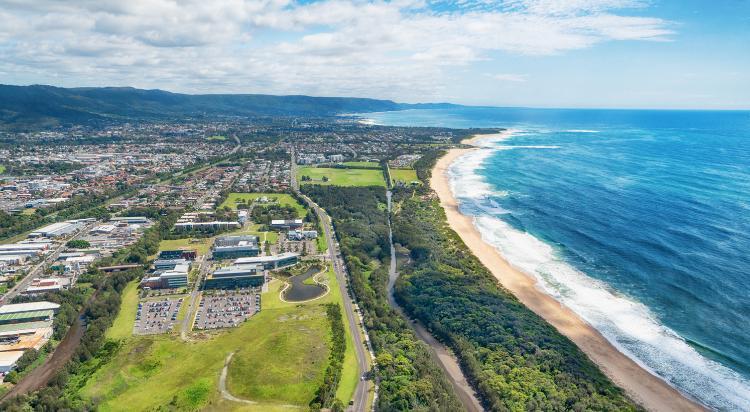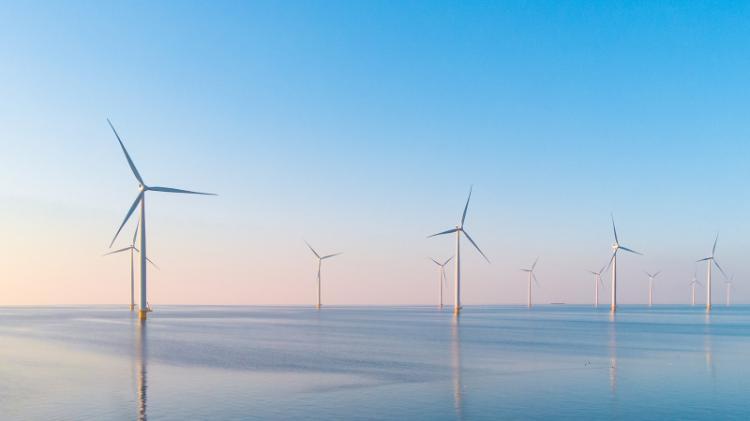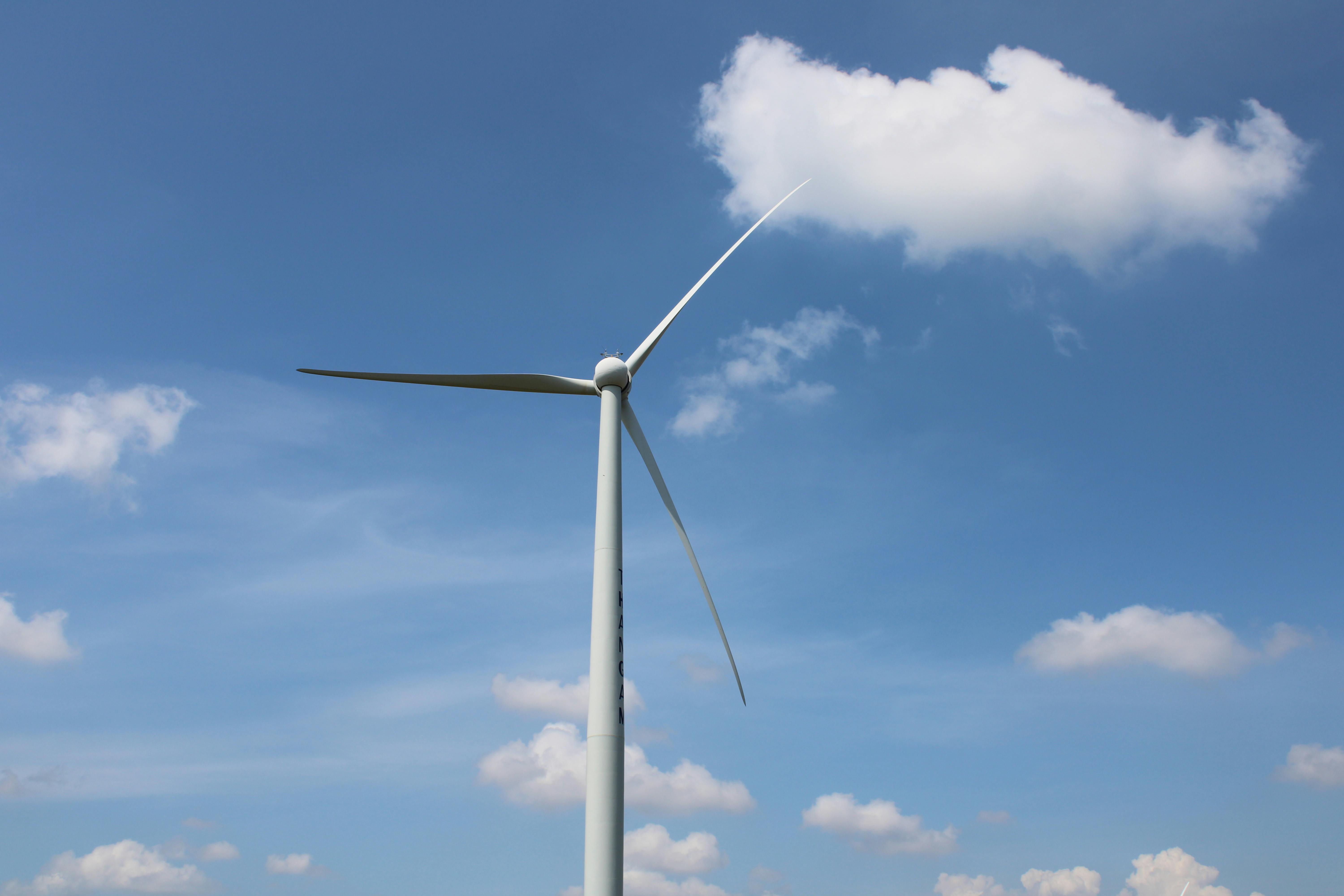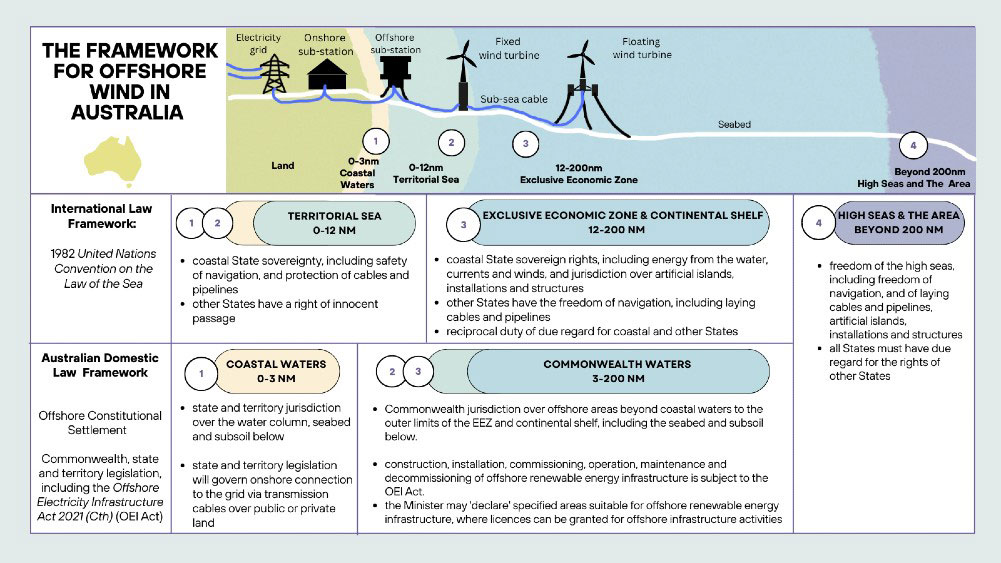Evidence-based research at the University of Wollongong (UOW) is critical to inform public policy and industry to enable a shift toward sustainable offshore renewable energy that equitably involves and contributes to vibrant coastal communities.
Blue Energy Futures Lab
Collaborative research for a sustainable blue future
UOW provides unique capabilities through a holistic approach to ocean and energy research in offshore energy domains. The Blue Energy Futures Lab is well placed to provide evidence-based advice to inform policy development, industry investment and community engagement.
To conduct and produce research that has real world application and impact, that reflects the wants and needs of community, that aligns with the world of industry, and that positively influences policy towards a sustainable future.
We aim to build and develop the capacity to co-design sustainable blue energy futures. We strive for equitable processes and outcomes in the future governance of our oceans.
The Blue Energy Futures Lab is a collaborative research network within the University of Wollongong.
As one of six proposed regions identified as suitable for the development of offshore wind, the Illawarra region will play an important role in Australia’s energy future. Energy transitions encompass all aspects of society; successful implementation of offshore renewable energy in the Illawarra will inevitably change future coastal environments, the social fabric of coastal communities, and the nature of future work.

About the lab
A developing and expanding interdisciplinary research team from the University of Wollongong and beyond, interested in the emergence of new offshore sustainable industries, such as offshore wind. Our research expertise includes areas such as law, social sciences, policy, economics, engineering, business, and marine sciences.
We recognise that Australia is undertaking an immense task in transitioning to a low carbon economy and that offshore industries (such as wind) will play a critical role in decarbonisation and in the development of future blue economies. We recognise that this is essential in mitigating the impacts of climate change. Our research capabilities reflect the interdisciplinary nature of our research collaborations. Our lab will draw together researchers from a growing cross-section of the university.
Our work is grounded in respectful acknowledgment of the critical School of Law role that First Nation communities must play in sustainable transitions. We endeavour to continually recognise and respect that our research is being done on Aboriginal Country (both land and sea) and to ensure that this is always reflected in the decisions that are made and how we conduct the research. We are committed to working in partnership with local First Nation communities and Indigenous leaders and researchers to foreground Indigenous Knowledges in our research practices.
- Blue Energy Futures Lab
- UOW Energy Futures Network
- UOW Research and Innovation
- Faculty of Business and Law
- Australian National Centre for Ocean Resources and Security (ANCORS)
- School of Business
- School of Law
- Faculty of the Arts, Social Sciences and Humanities
- Australian Centre for Culture, Environment, Society and Space (ACCESS)
- Faculty of Engineering and Information Sciences
- School of Civil, Mining, Environmental and Architectural Engineering
- School of Electrical, Computer and Telecommunications Engineering
- School of Mathematics and Applied Statistics
- ARC Training Centre in Energy Technologies for Future Grids
- Sustainable Buildings Research Centre
- Australian Power Quality Research Centre
- SMART Infrastructure Facility
- National Institute for Applied Statistics Research Australia
- Faculty of Science, Medicine and Health
Faculty of Business and Law (BAL)
Business School
- Dr Jennifer Algie
- Associate ProfessorTillmann Boehme
- Professor Corrine Cortese
- Associate Professor Micheal Mehmet
- Associate Professor Rabindra Nepal
- Associate Professor Matthew Pepper
Australian National Centre for Ocean Resources & Security (ANCORS)
- Associate Professor Michelle Voyer
- Dr Freya Croft
- Dr Jodi Edwards
- Dr Prakash Gopal
- Associate Professor Camille Goodman
- Professor Quentin Hanich
- Dr Dawoon Jung
- Duncan Leadbitter
- Dr Rachel Nichols
- Dr Makrita Solitei
- Dr Eric Van Doorn
- Candice Visser - PhD Candidate
- Dr Genevieve Quirk
Faculty of Arts, Social Sciences and Humanities
Australian Centre for Culture, Environment, Society and Space (ACCESS)
- Dr Chantel Carr
- Associate Professor Leah Gibbs
- Associate Professor Natascha Klocker
- Dr Christopher Brennan-Horley
- Natasha Larkin - PhD Candidate
Faculty of Science, Medicine and Health
School of Earth, Atmospheric and Life Sciences (SEALS)
Faculty of Engineering and Information Sciences
School of Civil, Mining and Environmental Engineering
School of Electrical, Computer and Telecommunications Engineering
UOW Research and Innovation
Sustainable Buildings Research Centre (SBRC)
Public submissions
Download the submission here [PDF 506KB]
Summary of our feedback and recommendations:
"As detailed further in the attached report, as a collective group of academics from diverse disciplinary backgrounds we support an accelerated movement towards a renewable energy future. We strongly endorse a rapid movement towards decarbonisation of our current energy base in order to contribute to global efforts to mitigate and address climate change. We believe all parts of Australia will need to play their part in this transition and as a region the Illawarra is both well suited, and strongly positioned to play a lead role in this. We therefore are working from the basis of in principle support for the development of offshore wind in the Illawarra, but with a firm commitment towards ensuring that these developments are done to the highest environmental, social and cultural standards.
As a University, we stand ready to play our part in ensuring that offshore wind, if it is to be developed in our region, can be underpinned by independent and rigorous research. We also believe UOW can play a critical role in training the skilled professionals that will be required to develop, assess and monitor the industry.
As detailed in the attached report, we put forward the following priority recommendations for consideration."
The researchers put forward several priority recommendations for consideration, including:
- The development of a workforce with the necessary knowledge and skills to drive innovation, research, and implementation.
- Greater oversight and planning in relation to key aspects of the assessment and approvals process
- Broader regional and national scale assessments conducted independently by trusted research institutions, to inform (but not replace) site-specific assessments by developers.
- First Nations engagement and partnership should be prioritised to avoid ‘terra nullius’ style assumptions and a coordinated approach to avoid unnecessary consultation burdens on First Nations organisations.
- Government education, intervention, guidance and regulation to ensure the planning process maximises community benefits.
The Blue Energy Futures Lab has no external funding. It is an internal collaboration space supported by the University of Wollongong’s Global Challenges program
Camille Goodman and Michelle Voyer, Submission to the Senate Environment and Communications Legislation Committee Inquiry into the Offshore Electricity Infrastructure Legislation Amendment Bill 2022, 1 November 2022
Figure 1: Image by Dr. Camille Goodman showing the regulatory framework for offshore wind in Australia
The image is a graphical representation of the elements involved in offshore wind, with a focus on the regulatory framework for offshore wind in Australia. The graphic shows offshore turbines and substations connected to on-shore transmission infrastructure by a submarine cable. The image also depicts the regulatory framework for offshore wind in Australia and how it applies in the maritime zones established under the United Nations Convention on the Law of the Sea, and the Australian domestic framework established by the Offshore Constitutional Settlement. The image is designed to help explain the complex system of offshore wind and its associated regulatory framework in a visual manner.
Read further about the regulatory framework for offshore wind in Australia.
Development needs independent and rigorous research
We (Blue Energy Futures) support the development of offshore wind in the Illawarra, provided the developments are done to the highest environmental, social and cultural standards. Everyone in the community can benefit from this, and we need to do it right.
Full story
Research and news
A snapshot of some of the recent and relevant publications by members of affiliated research Schools
Ocean Governance and Offshore Regulations
- Jung, Dawoon (2023) The 1982 Law of the Sea Convention and the Regulation of Offshore Renewable Energy Activities Within National Jurisdiction Vol. 28. BRILL
- Natasha Larkin, Chantel Carr & Natascha Klocker (2023) Building an offshore wind sector in Australia: economic opportunities and constraints at the regional scale Australian Geographer, DOI: 10.1080/00049182.2023.2276144
- Camille Goodman, (2023)‘Harnessing the Wind Down Under: Applying the UNCLOS Framework to the Regulation of Offshore Wind by Australia and New Zealand' Ocean Development & International Law, DOI: 10.1080/00908320.2023.2247327.
- Camille Goodman, (2022) ‘Winds of Change: Australia’s Offshore Electricity Infrastructure Act 2021’ Asia-Pacific Journal of Ocean Law and Policy 137-150.
- Camille Goodman, (2022) ‘Unlocking the framework for offshore wind in Australia’. CIPL Conversations (ANU College of Law Centre for International and Public Law, Australian National University)
- Michelle Voyer, Dominique Benzaken and Constance Rambourg (2022) Institutionalizing the Blue Economy: an examination of variations and consistencies among Commonwealth countries. Philosophical Transactions of the Royal Society, Vol 377, No 1854.
- Michelle Voyer and Judith van Leeuwen (2019) '‘Social license to operate’ in the Blue Economy.' Resources Policy, vol. 62: 102-113.
- Michelle Voyer, Genevieve Quirk, Anna Farmery, Lana Kajlich, & Robyn Warner, (2020) 'Launching a Blue Economy: crucial first steps in designing a contextually sensitive and coherent approach' Journal of Environmental Policy & Planning, pp. 1--18, doi:10.1080/1523908x.2020.1856054.
Emotion/ Values and Environmental Change
- Chantel Carr. (2023) ‘Repairing social connections; Dismantling carbon infrastructures with care’. Dialogues in Human Geography, DOI 10.1177/20438206231155707, Australian Centre for Culture, Environment, Society and Space.
- Chantel Carr. (2022) 'Repair and Care: Locating the work of the climate crisis' Dialogues in Human Geography. DOI 10.1177/20438206221088381, Australian Centre for Culture, Environment, Society and Space.
- Regional Transformation of Work and Economy
- Chris Gibson, Chantel Carr (2021) Craig Lyons, Lucy Taska Andrew Warren, ‘Covid-19 and the shifting industrial landscape’ Geographical Research’ DOI. 10.1111/1745-5871.12462. Australian Centre for Culture, Environment, Society and Space.
- Thomas Birtchnell and TIllmann Bohme (2020) ‘Supply Chains and the mobilities of Cargo’ Handbook of Research Methods and Applications for Mobilities, DOI 10.4337/9781788115469.00034, Australian Centre for Culture, Environment, Society and Space
Energy Transition and Energy Governance
- Amelia Hine, Chris Gibson, Chantel Carr (2022) Green hydrogen regions: emergent spatial imaginaries and material politics of energy transition SocArXIv, DOI. 10.31235/osf.io/7np9v. Australian Centre for Culture, Environment, Society and Space.
- Liang Cui, Mohammed Gabr, Wanniarachchige Gnamani Pabasara Kumari, Aziz Ahmed, Hasan Ozcan, Bahman Amini Horri, Subhamoy Bhattacharya, 17(5), p.1240.
- Han Phoumin, Rabrinda Nepal, Fukunari Kimura, Farhad Taghizadeh-Hesary (2024) Large-Scale Development of Renewables in the ASEAN. Springer, 2024.
- Robyn Dowling, Chantel Carr, Pauline McGurik (2022) ‘Orchestrating energy transitions: from ‘eco-bling’ to turning the building’ Social and Cultural Geography, DOI 10.1080/14649365.2022.2134581, Australian Centre for Culture, Environment, Society and Space.
Ocean Governance and Offshore Regulations
- Lucky Wuwung, Freya Croft, Dominique Benzaken, Kamal Azmi, Camille Goodman, Constance Rambourg, Michelle Voyer (2022) "Global blue economy governance – A methodological approach to investigating blue economy implementation." Frontiers in Marine Science, vol.9.
Oceans/ Coasts, Culture, Emotion, and Place
- Leah Gibbs, (2021) ‘Agency in human–shark encounter’. Environment and Planning E: Nature and Space, 4(2), pp.645-666. DOI 10.1177/2514848620929942, Australian Centre for Culture, Environment, Society and Space
- Leah Gibbs (2021) ‘On the Island, on the water, underwater’. Meanjin, 80(3), pp.9-12 Australian Centre for Culture, Environment, Society and Space
- Beatrice Meo, Sonia Graham, Eduard Ariza, Antonia Casellas, Deisane Delfino, (2021) ‘The resident and visitor gaze: A comparison of coastal values at risk due to sea-level rise’ Environmental Science and Policy, 123, pp 202-209, DOI 10.1016/j.envsci.2021.05.017 . Australian Centre for Culture, Environment, Society and Space
- Charles Gillon and Leah Gibbs (2019) ‘Coastal homemaking: Navigating housing ideals, home realities and more-than-human processes.’
Emotion/ Values and Environmental Change
- Lesley Head, Natashca Klocker, Ikerne Aguirre-Bielschowsky, (2019) ‘Environmental Values, knowledge and behaviour: Contributions on emergent literature on the role of ethnicity and migration’ Environment and Planning D: Society and Space, DOI 10.1177/0263775818811140, Australian Centre for Culture Environment and Society
Regional Transformation of Work and Economy
- Chris Gibson, (2022)‘Regional Futures in crisis: Lived experience and the generative role of intermediaries’ Australian Planner. DOI 10.1080/07293682.2022.2105916, Australian Centre for Culture, Environment, Society and Space
- Peter Macreadie, Alistar Robertson, Bernadette Spinks, Matthew Adams, Jennifer Atchison, Justine Bell-James, Brett Bryan, Long Chu, Karen Filbee-Dexter, Lauren Drake, Carlos Duarte, Daniel nFriess, Felipe Gonzalez, Quentin Grafton, Kate Helmstedt, Melanie Kaebernick, Jeffrey Kelleway, Gary Kendrick, Hilary Kennedy, Catherine Lovelock, Patrick Megonigal, Damien Maher, Emily Pidgeon, Abbie Rogers, Rob Sturgiss, Stacey Trevathan-Tackett, Melissa Wartman, Kerrie Wilson, and Kerrylee Rogers (2022) ‘Operationalising Blue Carbon’ Urban Science DOI 10.3390/urbansci3030086. Australian Centre for Culture, Environment, Society and Space
- Andrew Warren and Chris Gibson (2023) ‘Struggles over Skills: Lived Experiences of Evolving Technologies and Gendered Hierarchies at Work’ Annals of the Associations of American Geographers DOI doi-org.10.1080/24694452.2022.2157790.
- Jenny Atchison (2019) ‘Green and blue infrastructure in Darwin; carbon economies and the social and cultural dimensions of valuing urban mangroves in Australia’
Energy Transition and Energy Governance
- Care, O., Bernstein, M.J., Chapman, M. et al. (2021) Creating leadership collectives for sustainability transformations. Sustain Sci 16, 703–708 DOI https://doi.org/10.1007/s11625-021-00909-y. Australian Centre for Culture, Environment, Society and Space
- Robyn Dowling, Pauline McGuirk and Sophia Maalsen (2018). Multiscalar governance of urban energy transitions in Australia: The cases of Sydney and Melbourne. Energy Research & Social Science, DOI 10.1016/j.erss.2018.05.027. Australian Centre for Culture, Environment, Society and Space.
Indigenous Knowledge
- Anna Schlingmann, Sonia Graham, Petra Benyei, Esteve Corbera, Irene Martinez Sanestaban, Andrea Marelle, Ramin Soleymain-Fard, Victoria Reyes-Garcia (2021) ‘Global patterns for adaption to climate change by Indigenous Peoples and local communities. A systematic review.’ Current opinion in Environmental Sustainability. DOI. 10.1016/j.cosust.2021.03.002. Australian Centre for Culture, Environment, Society and Space.
Community Participation
- Crystal Legacy, Dallas Rogers, Nicole Cook, Kristian Ruming (2018) ‘Beyond the post-political: is public participation in Australian cities at a turning point? Geographical Research DOI. 10.1111/1745-5871.12304. Australian Centre for Culture, Environment, Society and Space.
Research and proposal
- Proposed offshore wind area: Pacific Ocean off Illawarra region, NSW -
- Research grant press release - Global Challenges returns to tackle the big issues
Local articles
- Illawarra Mercury -
- Illawarra Flame
- ABC news
- Other
If you are on a mobile device, sign up for the newsletter via this link:
Newsletter sign up
The Blue Energy Futures Lab has no external funding. It is an internal collaboration space supported by the University of Wollongong’s Global Challenges program.




